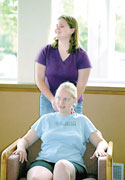Simulator gives feel of drunken driving

Stephanie Hanzell, freshman health promotion and wellness major, receives a massage from Audi Manary on Sept. 15 during Natural High week.
Drunk drivers came to Missouri Southern Sept. 15.
The Campus Activities Board invited the Save-A-Life drunk driving simulator to Billingsly Student Center for students to see the effects of drinking and driving.
Brian Beldyga, senior Save-A-Life manager, said, “We need to get to as many kids as possible to show them how their reflexes are delayed while drinking and driving.”
The simulator slows down the reactions users make while driving on a computer-simulated course.
“It is not a game,” Beldyga said. “We are here to educate.”
Beldyga said he would take someone off the simulator if he thought that person was turning it into a game.
The simulator was set up for any type of person.
“It doesn’t matter how much you weigh,” Beldyga said. “You’re going to get hammered.”
He said the simulator is a good way to view the effects of drinking while sober.
Approximately 350 students turned out for the simulator and other activities for the day.
James Patterson, freshman elementary education major, said, “It (the simulator) does play with your eyes and it shows you what it’s like when you’re drunk.”
Patterson also encouraged other students to make sure they know where their friends are if they plan to drink. He also said he likes to see someone take the responsibility to take the keys from someone who is drinking or at least offer a ride to a friend.
Other students agree after trying the simulator.
“It (the simulator) gives you a good sense of how it is to drive drunk,” said Katherine Overman, senior psychology major.
Overman skidded off the road and hit a building in the simulation.
“I felt really dizzy,” she said.
Julie Blackford, director of student activities, said the simulator cost $5,000 to bring to campus.
“You can’t put a price on teaching people not to drink and drive,” she said.
Blackford said the simulator is not brought to campus every year because of the price, but she has not seen it during the time she has worked on campus.
Beldyga said the simulator cost $$2.5 million to design and produce.
Other activities during the day were Kool-Aids for Kollege Students as well as drunk-driving glasses and stress-busting activities.
The stress busters included Legos and massages.
“The whole idea was trying to balance college life, time management, and relaxation,” said Dale Voigt-Catlin, counselor with the Student Support Center.
Voigt-Catlin said students can come by the support center at any time during the semester if they missed out on the activities.
She said the day also included a stress test and alcohol-problem indicator for students to use.
Anyone wishing to know more about their stress levels, they may go online to www.mentalhealthscreening.com.
The password for Southern students is “helpinghand.”
Your donation will support the student journalists of Missouri Southern State University. Your contribution will allow us to purchase equipment and cover our annual website hosting costs.



























